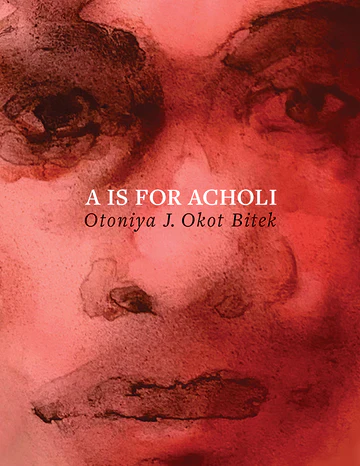A is for Acholi
By Otoniya J. Okot Bitek
Wolsak & Wynn
120 Pages, $20
A is for Acholi is a collection deeply connected with the concepts of place and displacement. In the opening stanzas, the poetic voice interrogates the concept of home, nation, and belonging. Otoniya J. Okot Bitek writes:
I’ve been thinking diaspora is & is not
the us of home &how&wherewe’reenough &
how this nation demands &
that nation extracts &
that other nation seeks but does not want us
The ampersands that connect each line of this introductory stanza, when combined with the crowded spacing of the words, create a sense of simultaneous joining and disjointedness that underpins the whole collection. By immediately situating the reader in this concept of diaspora, Okot Bitek creates a sense of immersion, preparing the reader to engage in the deft experimentation of the remaining text of A is for Acholi. The collection proceeds with an “alphabet for the unsettled”, where Okot Bitek pairs the English alphabet with footnotes as a framing device. Each letter of each poem in this section is “for Acholi”, and Okot Bitek uses
this framework to move through a trajectory of histories that range from the personal to the collective and national. In “C is for Acholi,” for example, C is both “for stories like floors with give” and “for Acholi & British & Canadian ID papers.” The corresponding footnote indicates that C is also for “Cartography / The trace of the arc of the apple to this point in time”. The poems throughout this section speak back to each other, creating a connective tissue that coheres its many concepts.
In the second section, “A Dictionary for un/settling”, Okot Bitek experiments with the idea of unsettledness through intertextual narratives, performing an “excavation” of Joseph Conrad’s text to speak back against its racism. Other poems in this section use sparse language to interrogate silence and speaking, and whose stories get told (and when, if ever.) In the poem “Settled/unsettled,” Okot Bitek plays with the numerous connotations of the term “settling,” writing that the term resettled is “to be turned / to be re-turned / to be unturned”. This resettling is something that recurs throughout the collection, as Okot Bitek turns over the English language and uses it to continuously experiment with connotation, image, repetition, and absence. The effect is to continuously “unturn” and upturn the reader’s perceptions, making the collection an incisive and rich reflection on how place and displacement makes meaning. By rooting the many subjects of A is Acholi—whether human, land, or abstraction—in a carefully balanced sense of unity and liminality, Okot Bitek explores diaspora and marginalization with a keen sense of observation that is only heightened by Okot Bitek’s experimental format.
—Tiffany Morris














